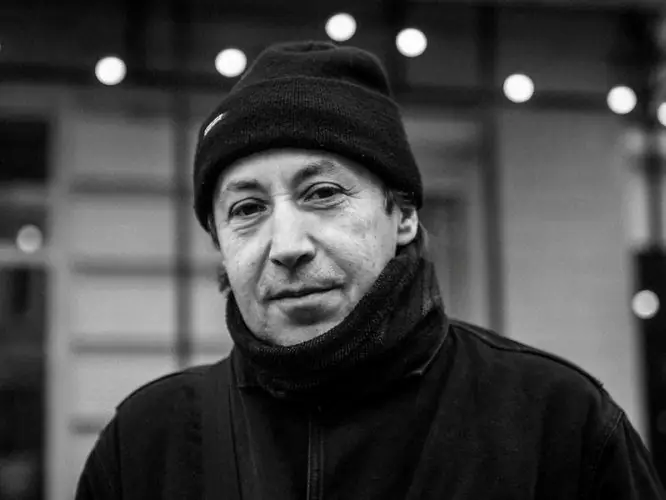- Author Antonio Harrison [email protected].
- Public 2024-01-09 15:32.
- Last modified 2025-01-22 21:44.
Igor Minaev began working as a director at a film studio in Odessa. In the midst of perestroika, the master of cinema moved to France, but continued to shoot feature films and documentaries that were of interest to his former fellow citizens. The director's work is multifaceted, and therefore not always unanimously evaluated by critics.

From the biography of Igor Evgenievich Minaev
The future Ukrainian and French director was born in Kharkov on January 15, 1954. Minaev received a good professional education. In 1977, Igor Evgenievich graduated from the Kiev Institute of Theatrical Art, directing course at the Faculty of Cinematography (workshop of V. Neber).
He began his career after high school at the famous Odessa film studio. The management did not like his first directorial job. For several years, the director was not allowed to work on his films.
In 1985, Minaev shoots a short film "Telephone" based on one of the poems by Korney Chukovsky. The role of Korney Ivanovich in the film was played by Lembit Ulfsak. Minaev's work was highly appreciated: in 1987 he received the prize of the children's jury of the Moscow Film Festival.
In the late 80s, Igor Evgenievich took off the art pictures "First Floor" and "Cold March". In these works, the author reflected the perestroika processes in the country. Both films were selected for screening at the Cannes Film Festival in 1988 and 1990. The director himself recalls a period of chaos and complete creative freedom. The creators could do everything they wanted, they didn't need too much money to create paintings.
In 2013, a film festival took place in Odessa, where the same film "First Floor" was presented in a retrospective screening on the theme "The Lost World". The audience saw the best films created by Ukrainian masters at the end of the Soviet era. Some of these films had not previously been shown because the country’s film distribution was destroyed.
Evaluating the work of the Ukrainian director, film critic L. Goseiko noted that the directors whose works were presented at the festival belong to the "overclocked revival": almost none of those masters have been able to find application for their talents in their homeland.

Foreign career of Igor Minaev
So it happened with Minaev. In 1988 he moved to France and settled in Paris. Here he taught for some time in one of the film schools, staged performances. One of his works from that period is “The Story of a Soldier” to the music of Stravinsky and “Florentine Nights” based on the autobiographical prose of Marina Tsvetaeva.
Minaev was lucky: he managed to take advantage of the support of the French foundation, which was interested in cooperation with cinematographers from countries of Eastern and Central Europe. Many directors, thanks to the support of the foundation, were able to shoot their films. Among these masters were Pavel Lungin, Vitaly Kanevsky and Igor Minaev.
In the early 90s, Minaev conceived and successfully implemented the screen version of E. Zamyatin's story "The Flood". Isabelle Huppert starred in the film.

A few years later, Igor Evgenievich creates the painting "Moonlit Glades". This is a dramatic story about a brother and sister who meet after years of separation. For this work, Minaev received a prize at the Kinoshock festival.
In 2006, Minaev's film “Far from Sunset Boulevard” was released. Critical responses were mixed. Some believed that the story told by the author of the film about a director with a non-standard sexual orientation, who shot musicals in Stalin's times, was presented in the film with unjustified simplifications, without taking into account the true drama of that era and the contradictions inherent in that time. The Russian press received the film of the former Soviet citizen Minaev with a grain of irony and even with ridicule. But at the festival of Russian cinema in Honfleur, France, the film received two prizes at once.
Other cinematic works of Minaev include: "Underground Temple of Communism" (1991), "Winter" (2010), "Blue Dress" (2016). For several of his films, Minaev wrote scripts himself.
Minaev had a chance to act as a critic. In 2010, the director was invited to the jury of the Montreal International Film Festival.

Igor Minaev as a documentary filmmaker
In March 2018, Igor Minaev and Yuri Leuta introduced the public to the documentary film "Cacophony of Donbass".
In an interview, Igor Evgenievich noted that he considers the Soviet past to be the reason for the events now taking place in the South-East of his native Ukraine. The starting point for the documentary was the film Symphony of Donbass (1931), which was thoroughly imbued with Soviet myths about the worker and the miner.
“The Cacophony of Donbass” may well be called a film about the influence of propaganda on society. In working on the film, its authors relied on newsreels and the work of their predecessors. The work in the archives and the search for the heroes of the documentary was carried out by Yu. Leuta.
The directors tried to show the true stories of people who are under the influence of propaganda, far from the Soviet "mythology". According to Minaev, the film looks like a real drama tearing the viewer apart. Although many shots look quite calm and casual.
As a director working in the West, Minaev wants his cinematographic work to be understandable not only to residents of the post-Soviet space, but also to those who know almost nothing about life in Ukraine. He believes that in this film he managed to highlight the ambiguous and contradictory term, which sounds unusual for the Western ear - “Donbass”.






